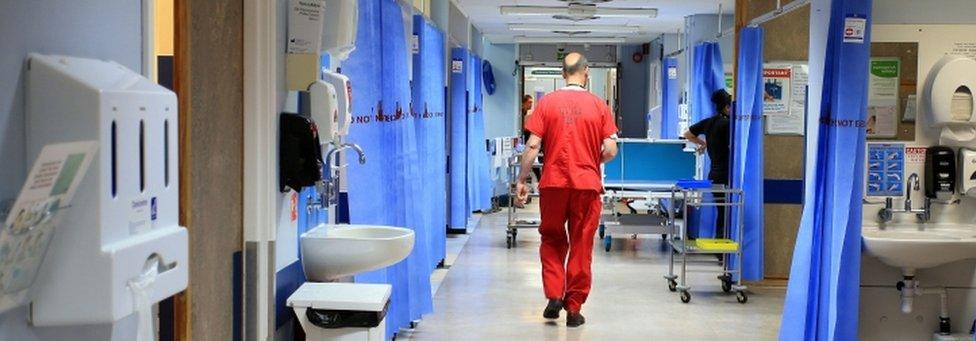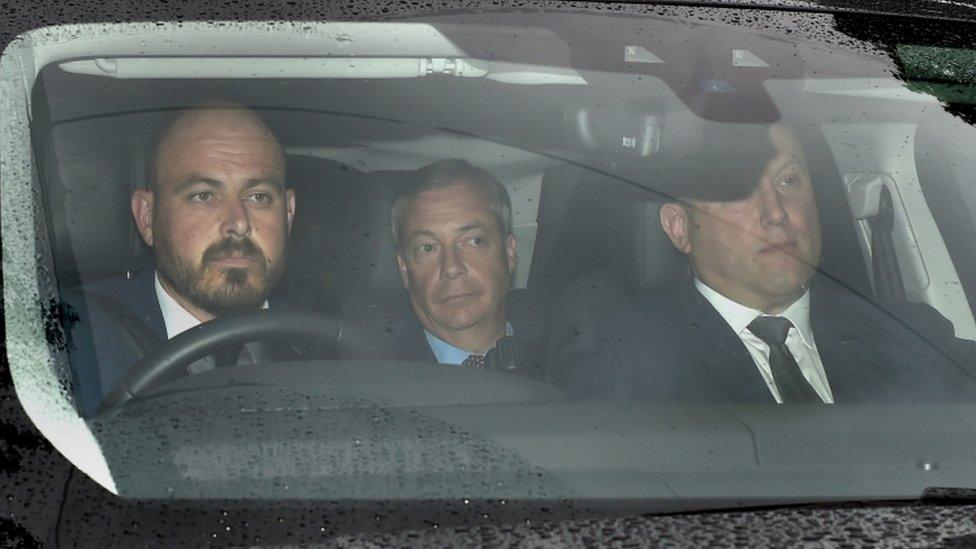Trump state visit: US president turns down meeting with 'negative' Corbyn
- Published
Jeremy Corbyn said he wanted "a dialogue" with the president about building "a better and more peaceful" world
Donald Trump has turned down a request from Jeremy Corbyn to meet during his state visit, calling Labour's leader "somewhat of a negative force".
The US president said he had been approached by Mr Corbyn, who boycotted Monday's banquet held in his honour.
Explaining his refusal, Mr Trump said: "I really don't like critics as much as I respect people who get things done."
Earlier, Mr Corbyn said Mr Trump's policies on immigration, human rights, trade and climate change were divisive.
Speaking at a protest rally in Westminster, the Labour leader said he was "very disappointed" by Mr Trump's latest attack on London Mayor Sadiq Khan, whom the president called a "stone cold loser".
But he told protesters he was prepared to have "a dialogue" with anybody about building a more peaceful, just world.
The Labour leadership confirmed they had sought a meeting with Mr Trump during his three-day visit to the UK and said Mr Corbyn remained "ready to engage with the president on a range of issues, including the climate emergency, threats to peace and the refugee crisis".
Meanwhile, Mr Trump spoke by phone to former foreign secretary Boris Johnson - one of the favourites to succeed Theresa May - on Tuesday night and is due to meet rival candidate Michael Gove.
He also had a private meeting with the Brexit Party leader Nigel Farage, one of the president's strongest political supporters in the UK.
Mr Farage said afterwards it had been a "good meeting".
Allow X content?
This article contains content provided by X. We ask for your permission before anything is loaded, as they may be using cookies and other technologies. You may want to read X’s cookie policy, external and privacy policy, external before accepting. To view this content choose ‘accept and continue’.

'I told him no'
Asked about the snub to Mr Corbyn during a press conference with Theresa May, Mr Trump said he had "never spoken" to the leader of the opposition.
"He wanted to meet with me and I told him no," he said.
"I think that he is, from where I come from, somewhat of a negative force. I think people should look to do things correctly rather than criticise."
However, he later told Piers Morgan in an interview for Good Morning Britain that although it had been "tough" and "probably inappropriate" to meet Mr Corbyn on this occasion, he would have "no problem" with meeting him another time.
While it is not mandatory for US presidents to meet opposition leaders and other non-government figures during state visits, it has been standard diplomatic practice.
Barack Obama held talks with Ed Miliband in 2011 and also met David Cameron during his first visit to the UK as president in 2009.
President Trump gives his opinion on three Tory leadership hopefuls
In his speech, the Labour leader did not mention Mr Trump by name but did refer to "our visitors", and said all governments had a duty to oppose racism and misogyny.
Mr Corbyn told demonstrators he wanted to have a "conversation" with the US president despite their multiple disagreements.
"I am absolutely not refusing to meet anybody. I want to be able to have that dialogue to bring about that better, more peaceful world that we all want to live in."
He appealed to Mr Trump to "chase down" all forms of racism, including Islamophobia, and take a more compassionate approach to the plight of refugees from war, religious persecution and the effects of climate change.
"Racism divides, exploitation of minorities divides, exploitation of minorities brings about hatred," he said.
NHS and trade
Mr Corbyn said he would oppose any post-Brexit trade deal with the US that allowed foreign companies "in to take over the NHS" - insisting he would defend a health service free at the point of use "with every breath in his body".
But after holding talks with Mrs May, Mr Trump said no area could be excluded from future trade discussions, including the NHS.
"When you are dealing with trade, everything is on the table, so the NHS and anything else."
This prompted an immediate response from Health Secretary Matt Hancock, one of the leading candidates to succeed Mrs May in Downing Street, as well as other candidates.
Allow X content?
This article contains content provided by X. We ask for your permission before anything is loaded, as they may be using cookies and other technologies. You may want to read X’s cookie policy, external and privacy policy, external before accepting. To view this content choose ‘accept and continue’.
Allow X content?
This article contains content provided by X. We ask for your permission before anything is loaded, as they may be using cookies and other technologies. You may want to read X’s cookie policy, external and privacy policy, external before accepting. To view this content choose ‘accept and continue’.

And Dominic Raab, who is also standing, tweeted that, external the NHS "is not for sale to any country and never would be" if he became prime minister.
The BBC's political editor Laura Kuenssberg said the issue was now likely to be a factor in the leadership race.
On Sunday, the US ambassador to the UK, Woody Johnson, told the BBC "all things that are traded would be on the table" - including healthcare.
The SNP's Ian Blackford, who also addressed the anti-Trump demonstration, said Scotland must "stand up for progressive values and against a damaging Tory-Trump trade deal".
The Welsh government said devolution must be respected and there was "absolutely no prospect" of the NHS being included in any post-Brexit negotiations.
Mr Trump later told Good Morning Britain's Morgan that actually he did not see the NHS as being on the table.
"Somebody asked me a question today and I said everything's up for negotiation because everything is, but I don't see that being... that's something that I would not consider part of trade. That's not trade," he said.

Is the NHS 'on the table'?

Analysis: By Hugh Pym, BBC Health editor
There is nothing to stop American or any other foreign firms bidding for NHS contracts under current rules. The health reforms in England in 2012 required local commissioners to put large contracts out to tender. A subsidiary of the US company United Health, along with British firms like Virgin and Circle, is among private groups which has won such contracts.
Around 7% of the English health budget goes to private providers. There are different contracting arrangements in other parts of the UK.
The head of NHS England, Simon Stevens, has called for new legislation to drop the requirement for health commissioners to put contracts out to tender. But if the government decides to do this it's not clear whether that might be overridden by the sort of trade deal Mr Trump would like to negotiate for the US. That's the suspicion of those who argue the NHS is vulnerable to covert privatisation.

Asked about the Tory leadership hopefuls, the president said: "I know Boris. I like him. I have liked him for a long time. I think he would do a very good job."
Referring to Foreign Secretary Jeremy Hunt, he continued: "I know Jeremy, I think he would do a very good job."
On Mr Gove - to laughter from the audience - he added: "I don't know Michael - would he do a good job Jeremy?"

Nigel Farage met Donald Trump after the president's press conference with Theresa May
Mr Trump said he had only seen one "very small protest" on Tuesday, in contrast to what he claimed were the "thousands of people" on the streets welcoming him and his family.
"I heard there were protests so I said 'where are the protests?'... A lot of it is fake news, I hate to say."